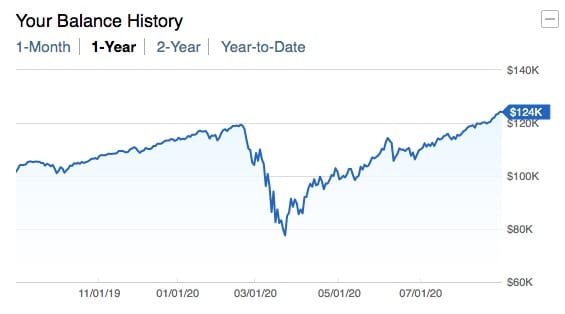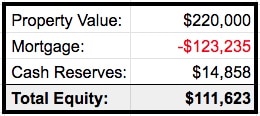
Rental Property vs Stocks – Tracking Experiment Continued …
A couple months ago I talked about comparing rental property vs stocks, using 2 of my personal assets as examples we can track over time. One is a personal IRA account (backstory here) which is invested in a total stock market index fund. The other is a duplex rental property located in Texas (backstory here).
On July 1st of this year, both of these assets were worth almost exactly the same amount… ~$109,600. Now, just 60 days later, there’s a huge difference in value between them.
My goal with tracking these two investments side-by-side is to see which one outperforms the other, both short-term and long-term.
I know it’s unfair to compare the growth of a physical rental property vs a stock portfolio because they are contrasting investment strategies. But, I’m gonna compare them anyway because I’m a weirdo and I think it’s fun! This experiment is kind of like racing a dog against a horse. ( I just got a funny image in my head). Each has unique strengths and weaknesses so it’ll be interesting to juxtapose them over time and debate about which is the better investment.
I just got a funny image in my head). Each has unique strengths and weaknesses so it’ll be interesting to juxtapose them over time and debate about which is the better investment.
Rental property vs stocks: Updates July & Aug 2020
As of September 1, here are the current values for each asset:
IRA account value: $124,117 (has grown +$14,515 since July 1)
Holy cow! Nobody could have predicted the recent stock market return and sharp bounce back after the crash earlier this year. As a reminder, this account is 100% invested in FSKAX, a Fidelity mutual fund that replicates the Dow Jones U.S. Total Stock Market Index. In March, this account went as low as $77k — what a fascinating recovery.

While I’d love for this crazy growth to continue, good times like this can’t go on forever. But unless there’s a sudden correction, it’s safe to say this IRA will be worth more than the rental property investment for a long while…
Rental property value: $111,623 (has grown +$1,997 since July 1)
Buy and hold real estate is a much slower and steadier investing game. I don’t think I’ll ever see a massive sudden surge in value (or dramatic downturn  ) for this property. For me, volatility is neither a good thing or a bad thing, because I’m invested for the long term regardless.
) for this property. For me, volatility is neither a good thing or a bad thing, because I’m invested for the long term regardless.
Here’s the rental property value breakdown, including the float account and reserve fund:

All in all, the value increased $1,997 over 2 months. The outstanding mortgage shrunk by $473 thanks to principal pay down, and the remaining $1,524 came from positive cash flow.
Cash reserves for real estate
I get a lot of questions about my cash reserve or “float account” for this rental property. Feel free to shoot me an email or comment for specifics, and I’ll address a few common questions here:
Why do you have so much cash in the reserve account?… At minimum, I like to keep about 6 month PITI (mortgage payment + tax + insurance) in the reserve account. Also, I pay property taxes (~$5k) and insurance (~$1k) out of this account in a lump sum. Having a large balance also covers expensive emergencies like blown A/C units or sudden loss of rental income.
Is this reserve account separate from your personal bank account?… Yes, I have separate checking accounts for each investment property I own. All mortgage payments are auto-deducted from their respective accounts, and rental income from each place is deposited into them. Although this sounds like a headache (managing multiple checking accounts), it’s actually all on auto-pilot, and it makes calculating individual ROI very easy.
Why do you include cash reserves as part of the asset value?… In my mind, the property can’t exist without the reserve fund. And the reserve wouldn’t exist without the property. So I count them as a single investment asset and count the reserve cash as part of the overall equity.
Rental property vs stocks: Active management vs. “passive income”!
In addition to looking at the money growth of these assets, I want to also be transparent about the time and energy that goes into maintaining these accounts.
For the IRA, I have spent zero hours managing or even thinking about this account. (OK, that’s a lie – I check the Stocks app on my iPhone about once every 5 minutes – a habit I need to break  ). But the point is that as an investor in the overall stock market I don’t need to touch anything to ensure account growth over time. It truly is passive investing.
). But the point is that as an investor in the overall stock market I don’t need to touch anything to ensure account growth over time. It truly is passive investing.
The rental property, however, is a slightly different story. Some months involve a ton of headaches, others are relatively light. Either way, rental property income is not passive income in my opinion.
I’ve been lucky these past few months, having no major repairs or tenant issues. But, I’ve still spent about 3-4 hours on this investment property. It took about 1-2 hours evaluating refinance options, about 30 mins reviewing monthly P&L statements and talking with my property manager, and maybe 1-2 hours ordering and reviewing a CMA (Comparative Market Analysis) for the property. Not a huge amount of time spent, but time spent nonetheless.
Now you could argue that I didn’t need to do these activities. But I would argue right back that if I didn’t constantly look at options to reduce expenses or increase cash flow, I would miss opportunities to boost my returns. For as long as I own this property I will need to continually analyze it as well as stay on top of what’s happening with the local housing market. It’s the burden of being a responsible real estate investor.
*Quick side note: Not ALL real estate investing involves personal management and effort. A publicly traded REIT (real estate investment trust) is a passive investment and can cover both residential real estate as well as commercial real estate. Personally I don’t do any REIT investing – it’s an investment strategy too advanced for my tiny brain 🙂
Future returns and predictions
As of Sept 1st, my IRA is outpacing the duplex by more than $12k. What will happen in the next few months? I have no clue. I have a feeling this is going to be a tortoise and the hare kind of story. Ultimately, I don’t really care which grows faster or slower, because I own them both already and plan to hold them for a long while.
Would love to hear your thoughts and predictions!
TLDR & summary
Since July, my IRA has grown by $14,515. Booyah! 
In comparison, my rental property’s value only increased $1,997.  (no complaints!)
(no complaints!)
The rental had 3-4 hours of management work… The IRA required zero.
Nobody knows what the future holds. We’ll check back in and compare these again in a few months. 🙂
Original Source: budgetsaresexy.com
Reader Q+A
I just had a baby boy and in between trying to figure out how to be a mom, I know I need to figure out health insurance. Help!
![]()
Original Source: blog.bernardbenefits.com